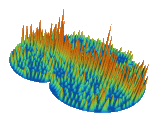Computing
Most of the code of the numerical computations for our research
is written in
Python
(employing efficient libraries in the back
with some parts using embedded
C++ or
cython).
Why Python? Python is a high-level, dynamic, object-oriented
programming language. In addition to scripts/programs
python can be used interactively.
Together with NumPy, SciPy and matplotlib it is an
excellent free alternative to commercial tools.
In addition one has the advantage of a complete programming
language.
For a simple example, see
Quantum maps
providing code to compute the eigenvalues of quantum maps and the
level spacing distribution.
Python packages for scientific computing
Python itself is already installed on most Unix systems during
the standard installation.
For Windows see, e.g.,
Anaconda.
Additionally needed/recommended packages are
- Numpy
(Base array package)
- Scipy
(Library for scientific computing )
- Matplotlib
(Interactive plotting and more)
- Ipython
(Enhanced interactive shell)
Highly recommended are
- Mayavi
(excellent 3D visualization)
- PyX
(publication-ready .eps/.pdf graphics)
A good explanation and
an overview of further packages can be found at
Scipy - getting starting.
Useful tools for scientific computation
py4science - talk given at IIT Madras, February 2017
Last modified: 08 November 2017, 20:23:52 ,
© Arnd Bäcker
